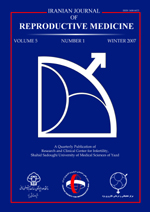
|
International Journal of Reproductive BioMedicine
Research and Clinical Center for Infertility, Shahid Sadoughi University of Medical Sciences of Yazd
ISSN: 1680-6433
EISSN: 1680-6433
Vol. 17, No. 2, 2019, pp. 79-88
|
 Bioline Code: rm19009
Bioline Code: rm19009
Full paper language: English
Document type: Research Article
Document available free of charge
|
|
|
International Journal of Reproductive BioMedicine, Vol. 17, No. 2, 2019, pp. 79-88
| en |
The protective effect of vitamin E on rats’ ovarian follicles following an administration of diazinon: An experimental study
Sargazi, Zinat; Nikravesh, Mohammad Reza; Jalali, Mehdi; Sadeghnia, Hamid Reza & Anbarkeh, Fatemeh Rahimi
Abstract
Background: Diazinon (DZN) is an organophosphate insecticide that has been widely
utilized in agriculture all over the world and caused many negative effects on different
species such as plants and animal species, especially on a human.
Objective: The aim of the present study was to evaluate the protective effect of vitamin
E on rats’ ovarian follicles following an administration of diazinon.
Materials and Methods: A total of 30 adult female Wistar rats were divided into five
groups: a control group (without any intervention), sham group (received only pure
olive oil, as solvent), experimental group I (DZN+olive oil, 60 mg/kg), experimental
group II (vitamin E, 200 mg/kg), and experimental group III (DZN: 60 mg/kg+vitamin
E: 200 mg/kg). All drugs were injected intraperitoneally, except vitamin E which was
administrated by gavage. The animals were scarified after two weeks and left ovary was
used to measure proliferation of ovarian follicles. Tissues were analyzed by the PCNA
technique and viewed with an optical microscope for evaluating cells proliferation.
Results: The result of the present study revealed that the number of proliferative cells
in the experimental group I decreased significantly in contrast to the control group
in secondary and Graffian follicles (p< 0.001). The administration of vitamin E plus
DZN significantly increased proliferative cells compared to the DZN group (p< 0.001).
Primordial follicles showed that all study groups were lacking PCNA positive cells,
which means no expression of PCNA in these follicles. The results of this study showed
that primary follicles in all study groups had a few and scattered PCNA positive cells
with no significant difference between the groups (p> 0.05).
Conclusion: Results showed that DZN reduced proliferation in secondary and Graffian
follicles and vitamin E increased it. The results of this study suggested that vitamin E
by its antioxidant activity was able to improve the DZN-induced ovarian toxicity.
Keywords
Diazinon; Proliferation; Ovary; Vitamin E; Rat.
|
| |
© Copyright 2019 - Zinat Sargazi et al.
Alternative site location: http://www.ijrm.ir
|
|
